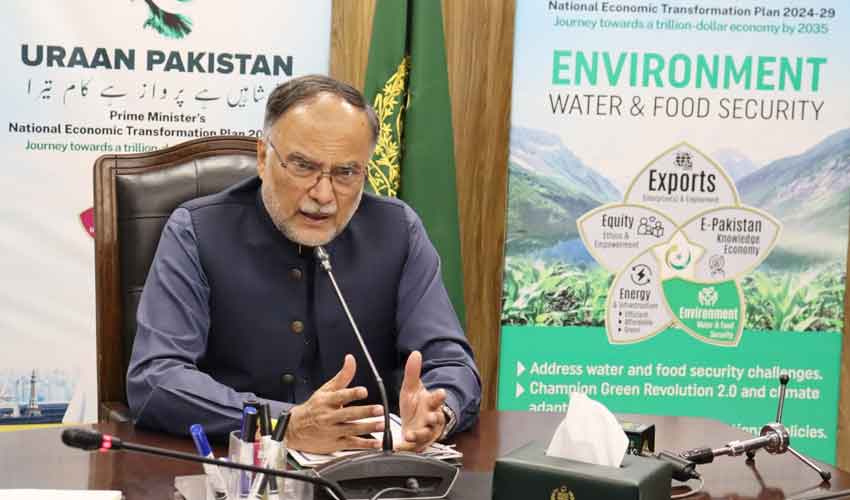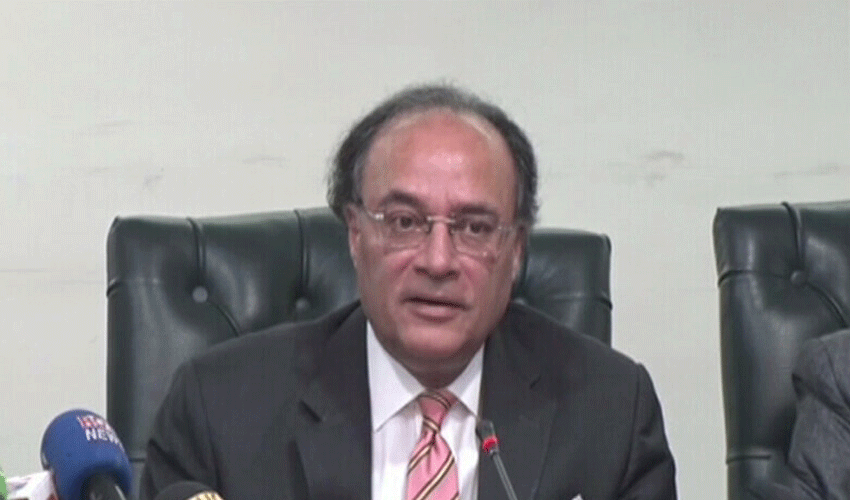Federal Minister for Planning, Development and Special Initiatives Ahsan Iqbal chaired two high-level meetings on Thursday, focusing on stabilizing essential commodity prices and building Pakistan’s national brand to boost exports and economic transformation.
In the first meeting, which reviewed current price trends across the country, the Pakistan Bureau of Statistics (PBS) revealed a significant deceleration in inflation. The Consumer Price Index (CPI) dropped to 0.7% in March 2025, compared to 20.7% in March 2024 -- a historic low.
According to the PBS report, rural inflation stood at 0%, while urban inflation showed a slight increase of 1.2%, primarily due to a decline in food prices. However, core inflation remained relatively high at 8.2% in urban areas and 10.2% in rural areas.
The minister welcomed the reduction in inflation as a major achievement but emphasized that more needs to be done to ensure price stability during peak consumption periods such as Ramadan, Eidul Fitr, and Eidul Adha.
Price volatility in key commodities
The PBS highlighted recent spikes in the prices of chicken, potatoes, onions, and bananas. The minister expressed concern over poultry price volatility and directed the Ministry of National Food Security and Research to promote the use of cold and frozen chicken for stable pricing.
He also recommended encouraging tomato paste production and called for analysis of urban-rural price differences in Islamabad.
Urgent reforms for agriculture and supply chain
Ahsan Iqbal criticized the lack of institutional frameworks for key agricultural products, stressing the urgent need for a national edible oil board, cold chain infrastructure, and a land optimization strategy to guide local crop production and imports.
He directed the food ministry to develop actionable plans for:
-
Establishing cold chains for perishables like chicken and vegetables
-
Promoting indigenous production of edible oil
-
Implementing optimal land utilization and crop-mixing strategies
The PBS also presented alarming data on wholesale-retail price gaps in major cities, with some differences — especially for onions and potatoes in Karachi and Quetta — exceeding 100%. The ICT administration requested detailed retailer lists from PBS to take action against profiteering.
PBS will now share market-wise data with provincial and district governments and provide three-month forecasts of demand and supply for essential items leading up to Eid.
Stakeholder consultative meeting on building national brand
In a separate meeting later in the day, Ahsan Iqbal convened top CEOs, brand strategists, and industry leaders to develop a unified branding strategy for Pakistan.
The session was part of the government’s 'Uraan Pakistan – National Economic Transformation Plan', which aims to position Pakistan as a trillion-dollar economy by 2035. A core component of the plan is revitalizing the “Made in Pakistan” brand to increase exports and enhance global visibility.
The minister stressed that national branding should reflect Pakistan’s culture, innovation, and entrepreneurial potential.
National centre for brand development on cards
Ahsan Iqbal announced plans to establish a National Center for Brand Development (NCBD) to support small and medium enterprises (SMEs), promote “Made in Pakistan” products, and reshape global perceptions of Pakistani goods.
He invited stakeholders to propose ideas for a unified brand tag that could serve as Pakistan’s identity in international markets. Participants strongly endorsed the long-term continuity of government branding efforts and emphasized the need for stable, consistent policies.
In his concluding address, the minister called for collective ownership of Pakistan’s image and urged citizens to speak positively about their country. “Just like a family member protects the family’s honour, we must promote Pakistan’s strengths rather than demean it,” he remarked.

























